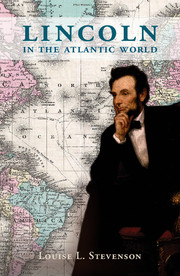Book contents
- Frontmatter
- Dedication
- Contents
- Acknowledgments
- Introduction: My Lincoln Lessons
- 1 The Second Shot Heard ’Round the World
- 2 African Lessons
- 3 European Lessons
- 4 German Lessons
- 5 English Lessons
- 6 Lessons from International Law
- 7 German Lessons for Reelection
- 8 The Last Lesson
- Notes
- Selected Bibliography
- Index
3 - European Lessons
Published online by Cambridge University Press: 05 November 2015
- Frontmatter
- Dedication
- Contents
- Acknowledgments
- Introduction: My Lincoln Lessons
- 1 The Second Shot Heard ’Round the World
- 2 African Lessons
- 3 European Lessons
- 4 German Lessons
- 5 English Lessons
- 6 Lessons from International Law
- 7 German Lessons for Reelection
- 8 The Last Lesson
- Notes
- Selected Bibliography
- Index
Summary
One month after winning reelection in 1864, President Lincoln gave an interview to Benson Lossing, a prominent historian of the American Revolution then preparing an illustrated history of the ongoing war. During their early December meeting in the Executive Mansion, Lossing did not raise questions about the crucial military and constitutional events of that year. Instead, the historian sought to clarify stories surrounding the surreptitious arrival of the president-elect into the nation's capital in February 1861. Four years later, these stories did not seem sideshows to the main events of the president's first term. Lincoln's attempt to refute them tells much about how he was trying to shape his legacy for a republican audience, in the United States and around the globe.
Plots to assassinate Lincoln bracket his presidency. Threats to Lincoln and his family started to arrive during the heated last months of the presidential campaign and became increasingly virulent after his election– even before South Carolina seceded on December 20, 1860. Such letters continued to appear until he departed Springfield for Washington on February 11.
These missives contained scathing words and illustrations that threatened the president-elect or informed him of plots against his life. In early January, he showed his friend Henry Clay Whitney, a fellow Illinois lawyer, an image of himself from Harper's Weekly that a critic had altered by inserting a gallows, a noose, and a black executioner's cap. From Louisiana, a critic damned him at least thirty times in a short letter of three paragraphs. The letter began: “God damn your god damned old Hellfired god damned soul to hell.” Besides damning Lincoln, another correspondent composed an epistolary tantrum. He called Lincoln a “sundde of a bith” and a “goddam Black nigger,” swearing at him to kiss his “Ass, suck my prick and call my Bolics [testicles] your uncle Dick.” Carried away by his language, the correspondent signed the letter and then told Lincoln as an afterthought what might happen if he did not resign: six more states would secede.
Cautioned by letters such as these and the threats that appeared in the pro-secession media, Lincoln and his confidants planned his railroad trip from Springfield, Illinois, to Washington for the inauguration on March 4.
- Type
- Chapter
- Information
- Lincoln in the Atlantic World , pp. 71 - 103Publisher: Cambridge University PressPrint publication year: 2015



